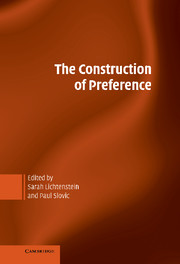Book contents
- Frontmatter
- Contents
- Contributors
- Preface
- Acknowledgments
- I INTRODUCTION
- II PREFERENCE REVERSALS
- III PSYCHOLOGICAL THEORIES OF PREFERENCE REVERSALS
- IV EVIDENCE FOR PREFERENCE CONSTRUCTION
- V THEORIES OF PREFERENCE CONSTRUCTION
- VI AFFECT AND REASON
- VII MISWANTING
- 27 New Challenges to the Rationality Assumption
- 28 Distinction Bias: Misprediction and Mischoice Due to Joint Evaluation
- 29 Lay Rationalism and Inconsistency Between Predicted Experience and Decision
- 30 Miswanting: Some Problems in the Forecasting of Future Affective States
- VIII CONTINGENT VALUATION
- IX PREFERENCE MANAGEMENT
- References
- Index
27 - New Challenges to the Rationality Assumption
Published online by Cambridge University Press: 05 June 2012
- Frontmatter
- Contents
- Contributors
- Preface
- Acknowledgments
- I INTRODUCTION
- II PREFERENCE REVERSALS
- III PSYCHOLOGICAL THEORIES OF PREFERENCE REVERSALS
- IV EVIDENCE FOR PREFERENCE CONSTRUCTION
- V THEORIES OF PREFERENCE CONSTRUCTION
- VI AFFECT AND REASON
- VII MISWANTING
- 27 New Challenges to the Rationality Assumption
- 28 Distinction Bias: Misprediction and Mischoice Due to Joint Evaluation
- 29 Lay Rationalism and Inconsistency Between Predicted Experience and Decision
- 30 Miswanting: Some Problems in the Forecasting of Future Affective States
- VIII CONTINGENT VALUATION
- IX PREFERENCE MANAGEMENT
- References
- Index
Summary
INTRODUCTION
The assumption that agents are rational is central to much theory in the social sciences. Its role is particularly obvious in economic analysis, where it supports the useful corollary that no significant opportunity will remain unexploited. In the domain of social policy, the rationality assumption supports the position that it is unnecessary to protect people against the consequences of their choices. The status of this assumption is therefore a matter of considerable interest. This chapter argues for an enriched definition of rationality that considers the actual outcomes of decisions and presents evidence that challenges the rationality assumption in new ways.
The criteria for using the terms “rational” or “irrational” in nontechnical discourse are substantive: One asks whether beliefs are grossly out of kilter with available evidence and whether decisions serve or damage the agent's interests. In sharp contrast, technical discussions of rationality generally adopt a logical conception, in which an individual's beliefs and preferences are said to be rational if they obey a set of formal rules such as complementarity of probabilities, the sure thing principle, or independence of irrelevant alternatives. In the laissez-faire spirit of modern economics and decision theory, the content of beliefs and of preferences is not a criterion of rationality – only internal coherence matters (Sen, 1993). The methodology of the debate reflects this concern for consistency: In the classic paradoxes of Allais (1953) and Ellsberg (1961), for example, two intuitively compelling preferences are shown to be jointly incompatible with the axioms of expected utility theory, though each preference is unobjectionable on its own.
- Type
- Chapter
- Information
- The Construction of Preference , pp. 487 - 503Publisher: Cambridge University PressPrint publication year: 2006
- 7
- Cited by



